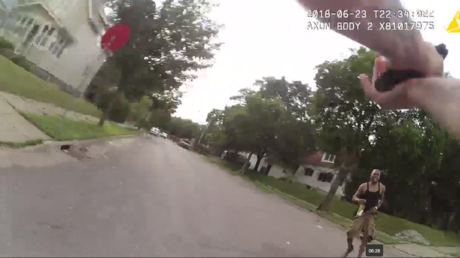FBI paid dossier author Christopher Steele, heavily redacted documents show
The FBI has released 70 pages of documents related to contacts with British spy Christopher Steele, author of the notorious Trump-Russia dossier. Though almost entirely whited out, the documents still show FBI paid Steele.
The documents were released on Friday after the conservative watchdog group Judicial Watch sued to get access to them under the Freedom of Information Act (FOIA). The release consists of fifteen FD-1023 source reports, thirteen FD-209a contact reports, eleven FD-794b payment requests, a FD-1040a document severing the bureau’s relationship with Steele, and a FD-1057 form showing Steele was “verbally admonished” by the FBI for an unspecified transgression.
The FBI just released 71 pages of documents on its relationship with Christopher Steele. Here is what 70 of the pages look like. #whitewashhttps://t.co/L3BWou7rLOpic.twitter.com/XzMIeDkpgS
— Max Blumenthal (@MaxBlumenthal) August 3, 2018
The FD-1040a form explains why the FBI discontinued its relationship with Steele as a “confidential human source” (CHS):
“CHS confirmed to an outside third party that CHS has a confidential relationship with the FBI. CHS was used as a source for an online article. In the article, CHS revealed CHS’ relationship with the FBI as well as information that CHS obtained and provided to FBI. On November 1, 2016, CHS confirmed all of this to the handling agent. At that time, handling agent advised CHS that the nature of the relationship between the FBI and CHS would change completely and that it was unlikely that the FBI would continue a relationship with the CHS. Additionally, handling agent advised that CHS was not to operate to obtain any intelligence whatsoever on behalf of the FBI.”
Perhaps the most puzzling document is the FD-1057, noting that Steele was “admonished” by a FBI handler for an unspecified infraction. That document is dated February 2, 2016. Yet Fusion GPS would not hire Steele to compile a dossier on then-candidate Donald Trump until June, according to media reports that have not been denied by the FBI or Fusion executives.
“The anti-Trump Russia ‘investigation’ had Christopher Steele at its center and his misconduct was no impediment to using information from his Russia intelligence collaborators to spy on the Trump team,” Judicial Watch president Tom Fitton said on Friday. “The corruption and abuse is astonishing.”
The documents, while almost a “literal whitewash,’ align with the claims by US President Donald Trump and his supporters that the FBI’s Russia investigation was politically motivated, journalist Max Blumenthal told RT.
“Despite its complete redaction, it does confirm part of Trump’s narrative that the FBI was colluding with the Clinton campaign, because we also know that Christopher Steele was employed trough Fusion GPS, an opposition research firm and the contract was taken out by Perkins Coie, which is the law firm of Hillary Clinton’s campaign,” Blumenthal said.
The FBI needed Steele to dig at Trump in the first place because some agents with a bias against Trump, which was later laid bare in their emails, wanted to create an impression of objectivity.
“Seems to me there were partisan officials inside the FBI who’ve gone on record saying they feared Trump’s selection and that they were trying to establish plausible deniability working through a third party that was also funded by the Clinton campaign,” Blumenthal said.
As documented in the memo by the House Intelligence Committee's Republican majority, Steele’s “dossier” was used as the primary basis of a FISA surveillance warrant against former Trump campaign adviser Carter Page, obtained by the FBI in October 2016. Even though the bureau cut Steele off within weeks of the initial application, the dossier continued to be used to secure the three subsequent renewals.
The applications did not clearly describe the dossier as commissioned by the opposing party, and definitely did not disclose the disruption of relations between Steele and the FBI. Meanwhile, the FBI cited Steele’s reliability to vouch for the information contained in the dossier, without ever independently verifying any of it.
Like this story? Share it with a friend!















